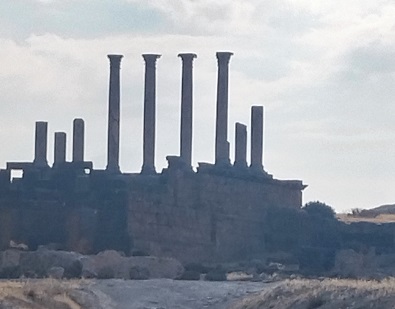Henkir El Kasbath and Sousse (Tunisia)
Rediscovering Roman Tunisia

Coordinator/Mission Manager
Antonella Coralini
Field of research and classifications
Archaeological disciplines from prehistory to the medieval age
VRA: area 10
ERC: SH6, The Study of the Human Past.
SDGs: 4) Quality education; 8) Decent Work and Economic Growth;; 11) Sustainable cities and communities;
Prevalent type of public engagement
Organization of initiatives for the enhancement and sharing of research
Co-production of knowledge initiatives
Creation of videos for social media
Management of social media pages and profiles
Active participation in public events organized by other entities
Description
The activities of the Tunisia-Italy cooperation, launched in 2020, aim to enhance the knowledge and appreciation of Tunisia's archaeological heritage, with a particular focus on the Roman period. Two case studies are central to this project: Thuburbo Maius/Henkir El Kasbath, a deserted city (urbs extincta), and Hadrumetum/Sousse, a city with continuous life.
In addition to field research and educational campaigns, the cooperation program includes the development of initiatives to communicate research results, targeting not only the scientific community but also the general public. The main objective is to increase local public awareness of archaeological heritage, both as a resource to protect and, importantly, as a potential source of employment and income. To this end, all communication activities have been primarily aimed at the general public, while also ensuring the direct involvement of local labor.
On both fronts, the impact has been entirely positive, as evidenced by the success among the public and the positive feedback from the workers who participated in the field campaigns.
Locations and periods
The activities take place in Tunis, Thuburbo Maius, Zaghouan, and Sousse.
In addition to the field campaigns, which occur in the spring (4 weeks) and autumn (4 weeks), the project includes Third Mission campaigns (spring, winter), primarily at the Université de La Manouba and the Institut National du Patrimoine:
- Tunis, Institut National du Patrimoine, October 4, 2023: "BIM and Its Applications in the Study and Valorization of Cultural Heritage."
- Tunis, Université de la Manouba, October 12, 2023: "Enhancing the Site of Thuburbo Maius."
- Tunis, Institut National du Patrimoine, May 21, 2024: "HBIM in the Process of Cultural Heritage Conservation."
- Tunis, Institut National du Patrimoine, May 22, 2024: "Communication and Valorization of Cultural Heritage."
Collaborations and partners
Involved Institutions, with the University of Bologna:
- Ministry of Foreign Affairs and International Cooperation
- Italian Institute of Culture in Tunis
- Institut National du Patrimoine de Tunis
- Université de La Manouba
- Université de Carthage
- University of Rome La Sapienza
- Université de Perpignan
The activities involve not only professors, researchers, and officials from the participating institutions but also students from Bachelor's degree programs and students from the Specialization School in Archaeological Heritage of the University of Bologna, as well as Bachelor's students and PhD candidates from the Université de La Manouba and the Université de Carthage.
Objectives and Engaged Audiences
The main objective is to increase local public awareness of archaeological heritage, both as a resource to be protected and, importantly, as an opportunity for employment and income. The primary target groups are the local community, students at all educational levels, teachers at all educational levels, the general public, professionals, and individuals undergoing re-orientation due to unemployment.
Impact and Evaluation Tools
The expected outcome is to raise awareness among the Tunisian public about the knowledge and protection of archaeological heritage, ranging from primary school students to workers from other sectors.
In particular, the involvement of local labor, especially female workers, in the maintenance activities at the site not only contributes to supporting multiple families but also plays a key role in instilling a sense of value—among the locals—towards living in a region rich in archaeological heritage. The highly positive feedback received from these events has led to the introduction, in the 2024 agenda, of the "Open Doors Day" initiative.
The success of the outreach activities on the methods and techniques of intervention, in the form of presentations accessible to all interested parties held in 2023 and 2024, can be measured by the number of participants.
Facebook was the most widely used social media platform, yielding excellent results in terms of media exposure, as evidenced by the volume of interactions. The coverage in digital media has been highly positive.
Keywords
Maghreb, Mediterranean, Heritage, Valorization
- 2022 Campaign Video:
Watch here - 2023 Campaign Video:
Watch here - Thuburbo Project Facebook Page:
Visit here - Institut National du Patrimoine Facebook Page:
Visit here - Italian Institute of Culture in Tunis Facebook Page:
Visit here